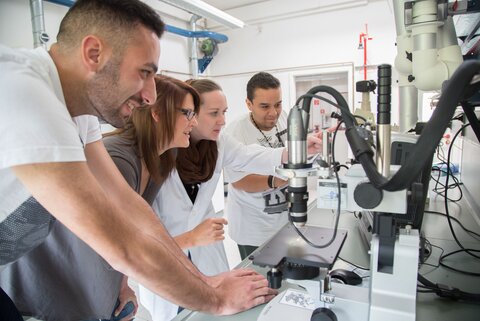Programme content and structure
Specialisation for future requirements
The "Micromedical Engineering" degree programme responds to the requirements of the future trend of the new miniaturised medical technology - the increasing development of the progress dimensions "miniaturisation", "computerisation" and "biologisation" in medical technology. It thus corresponds exactly to the long-term trends in medical technology - the degree of miniaturisation is constantly increasing, more and more electronics are being incorporated and more and more manufacturing processes originating from microelectronics are being used. Implant surfaces are being adapted more and more intelligently to the biological environment through new coating processes in terms of biocompatibility and biostability.
All these important fields of micromedicine for medical technology are addressed in this master's programme.
Entry requirements
MZT specifics
Modules and focuses
This is what you get to do on this course:
Introduction to Medical Technology, Advanced Technical Medicine, Special Areas of Medicine, Microtechnology, Medical Metrology, Telemedicine, Manufacturing and Production Technology in Medical Technology, Electives.
Further specialisations are:
Medical Technology, Medical Metrology, Medical Microsystems Engineering, Microtechnologies, Smart Systems, Medicine in the Context of Micromedicine, Neurophysiology, Endoprosthetics,
Biocompatible Materials, Coating Technologies, Intelligent Active Implants, Wireless Transmission of Energy and Signals, Therapeutic Systems and Technologies and Biomechanics.
Special features
Good reasons for choosing HFU
Why is micromedical engineering at HFU a particularly worthwhile degree programme? Our professors have enormous experience - with several hundred publications, including in high-ranking peer-reviewed journals, and the supervision of several doctoral theses to their credit. We maintain cooperative relationships with prestigious universities such as Freiburg or Tübingen and many project collaborations with industrial companies (e.g. Retina Implant AG) and research institutions (e.g. IMTEK, Hahn Schickard, NMI) that are active in this field.
We at HFU were the first in Germany to offer this engineering programme at the interface of medicine, medical technology and microsystems technology. Our university stands for many years of experience in medical technology and biotechnology. It's important to us to provide you with an interdisciplinary education, with many research-oriented projects in teaching. We're also a member of professional associations so that we constantly receive new impulses for the further development of course content.
Your career prospects
Possible career paths
Graduates of the Micromedical Engineering master's degree programme are qualified for jobs in research and development at medical technology companies, in product management, in approval and in technical sales of micromedical technology products.
The following are concrete options:
- Medical technology companies: Development and optimisation of medical devices, implants and technical aids for diagnosis and therapy, support for medical approval for the national and international market. As a specialist in his company, the graduate is an application-oriented discussion partner for doctors, research and development partners and other users of the developed devices as well as in highly qualified product management
- Research institutions, universities (doctorate): Research and development in the field of high-tech systems (e.g. intelligent implants, navigation systems for neurosurgery and orthopaedics, minimally invasive surgery etc.) as well as cooperative implementation of clinical studies
- Clinics, hospitals and medical care centres: application of complex technical devices, e.g. in the use of intelligent implants in neurosurgery
- Authorities and health insurance companies: Assessment and approval of micromedicine devices and evaluation of the health-promoting benefits for patients as well as quality control. Scientific evaluation of micromedical products.
Very practice-oriented, small working groups, and the university is excellently networked with other universities, companies and institutions.
 Julia Wildenhain (Bachelor in Ulm, Master with us, now Product Maintenance Engineer)
Julia Wildenhain (Bachelor in Ulm, Master with us, now Product Maintenance Engineer) Events
Further dates and eventsUnfortunately, there are currently no events planned that we can display here. We have compiled an overview of all planned events in the event calendar.
Your key contacts
We are the micromedical experts - and are happy to advise you!

Micromedical Engineering (MSc) (MZT)/
Biomedical Engineering (MSc) (BME)
Head of the local Ethics Commission

